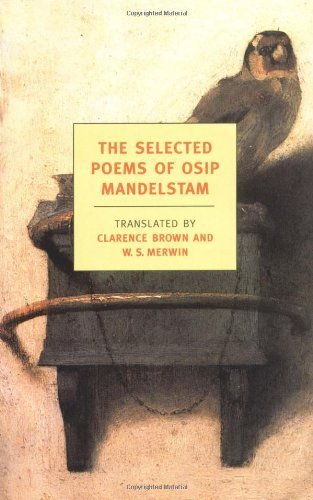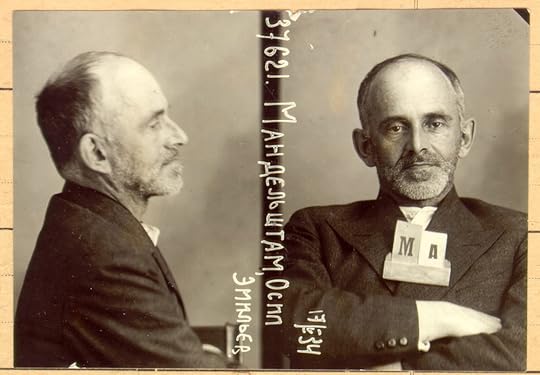What do you think?
Rate this book


Unknown Binding
First published January 1, 1972
Sleeplessness. Homer. Taut sails.
I have counted half the catalogue of ships:
That caravan of cranes, that expansive host,
Which once rose above Hellas.
When the city moon looks out on the streets,
And slowly lights the impenetrable town,
And darkness swells, full of melancholy and bronze,
And songs of wax are smashed by the harshness of time;
And the cuckoo is weeping in its stone tower,
And the ashen woman descends to reap the dead world,
Quietly scattering huge spokes of shadow,
And strews yellowing straw across the floorboards…
We exist, without sensing our country beneath us,
Ten steps away our words evaporate,
But where there are enough for half a conversation
We always commemorate the Kremlin’s man of the mountains.
His fat fingers slimy as worms,
His words dependable as weights of measure.
His cockroach moustache chuckles,
His top-boots gleam.

The shy speechless sound
of a fruit falling from its tree,
and around it the silent music
of the forest, unbroken…
O Lord, help me live through this night—
I’m in terror for my life, your slave:
to live in Petersburg is to sleep in a grave.
You’re still alive, you’re not alone yet—
she’s still beside you, with her empty hands,
and a joy reaches you both across immense plains
Through mists and hunger and flying snow.
"Mestra dos olhares culpados, dona
dos ombros pequenos! Tens domada
a perigosa índole masculina —
de ti não vem a naufragada-fala.
Nadam peixes inflando as guelras,
vermelhas barbatanas: pega-lhes, pronto!
Em silêncio dizem "o" com as bocas,
dá-lhes a comer o meio pão do corpo!
Não somos peixes vermelho-dourados,
nosso costume fraterno tem outras sinas:
no corpo quente, costelas magras e o brilho
húmido e inútil das pupilas.
Marcam o rumo fatal cílios-sementes
de papoila...Então por que me arrebata,
como a janíçaro, esta volátil, vermelha,
breve meia-lua humilde dos lábios?...
Não te zangues, turca adorada,
eu meto-me contigo no saco tenebroso,
engulo tuas palavras obscuras,
beberei por ti a água esconsa.
És socorro, Maria, de quem morre.
Há que adormecer, a morte prevenindo.
Aqui me fico, no limiar severo —
vai-te embora, vai, fica ainda..."
It is only very conditionally possible to speak of poetic speech or thought as sonorous, for we hear in it only the crossing of two lines, and of these one, taken by itself, is absolutely mute, while the other, taken apart from its instrumental metamorphosis, is devoid of all significance and all interest and is subject to paraphrase, which is in my opinion the truest sign of the absence of poetry. For where one finds commensurability with paraphrase, there the sheets have not been rumpled; there poetry has not, so to speak, spent the night.Repeatedly, as I read the poems in this collection, I had to confess my inadequacy. I would read a stanza, say to myself that it was great, and start wondering wherein that great lay. Some lines hit you like a sledgehammer wielded with immense force, such as in this lines written while the poet was imprisoned in Siberia:
You took alway all the oceans and all the room.Then there are the striking images, as in Poem 129 written in 1922:
You gave me my shoe-size in earth with bars around it.
Where did it get you? Nowhere.
You left me my lips, and they shape words, even in silence.
The scalp tingles with cold.What an image! I think I will find myself coming back to these poems because they continue to resonate. As I do not know Russian, I cannot evaluate the translation by Clarence Brown and W. S. Merwin. To the extent that it repeatedly stops me in my tracks, wondering, it is highly successful.
Nobody speaks out.
Time pares me away
Like the heel of your shoe.
Life overcomes life.
The sound fades out.
Something is always missing.
There's no time to remember it.
You know, it was better before.
But there's no comparing
how the blood used to whisper
and how it whispers.
It's plain that some purpose
is moving these lips.
The tree-top laughs and plays
into the day of the axes.
No, it’s not for me to duck out of the messHis work is spectacular.
behind the cabdriver’s back that’s Moscow.
I’m the cherry swinging from the streetcar strap of an evil time. What am I doing alive?
We’ll take Streetcar A and then Streetcar B,
you and I, to see who dies first.
You took away all the oceans and all the room.
You gave me my shoe-size in earth with bars around it.
Where did it get you? Nowhere.
You left me my lips, and they shape words, even in silence.
I thought – no need for speeches:
We are not prophets nor precursors,
We do not delight in heaven nor live in fear of hell,
In dull noon we burn like candles.
To read only children’s books, treasure
Only childish thoughts, throw
Grown-up things away
And rise from deep sorrows.
I’m tired to death of life,
I accept nothing it can give me,
But I love my poor earth
Because it’s the only one I’ve seen.
In a far-off garden I swung
On a simple wooden swing,
And I remember dark tall firs
In a hazy fever.
What shall I do with the body I’ve been given,
So much at one with me, so much my own?
For the quiet happiness of breathing, being able
To be alive, tell me to whom I should be grateful?
Let the moment’s condensation vanish without trace:
The cherished pattern no one can efface.
A sadness beyond words
Opened two huge eyes,
The vase of flowers woke up
And its crystal made a splash.
The whole room filled
With languor – that sweet medicine!
Such a small kingdom
To swallow so much sleep.
Words are unnecessary,
There being nothing to learn:
How sad and exemplary
Is an animal’s dark heart!
It has no urge to instruct
And no use for words,
And swims like a young dolphin
Along the grey gulfs of the world.
The sea’s chest breathes calmly,
But the mad day sparkles
And the foam’s pale lilac
In its bowl of turbid blue.
May my lips attain
The primordial muteness,
Like a crystal-clear sound
Immaculate since birth!
Remain foam, Aphrodite,
And – word – return to music;
And, fused with life’s core,
Heart be ashamed of heart! (Silentium)
I am overcome by dread
In the face of mysterious heights;
I’m satisfied by a swallow in the sky
And I love the way a bell-tower soars!
I feel I am the age-old traveller
Who, on bending planks, above the abyss,
Listens to the snowball grow
And eternity strike on stone clocks.
If it could be! But I am not that wayfarer
Flickering against faded leaves:
True sadness sings in me.
There’s an avalanche in the hills!
And all my self is in the bells,
Though music cannot save one from the abyss!
I’m not in favour of premeditated happiness:
Sometimes nature is a grey blemish
And I’m sentenced, slightly tipsy,
To taste the colours of impoverishment.
The wind is playing with a tousled cloud,
The anchor scrapes the ocean bottom;
My mind, lifeless as linen,
Hangs over nothingness.
But I like the casino on the dunes:
The vast view from the misty window,
A thin ray of light on the crumpled tablecloth;
And, with greeny water all around,
When, like a rose, the wine is in its glass,
I like to follow the sea-gull’s wings!
When I am old may my sadness gleam.
I was born in Rome; it has come back to me;
Kind Autumn was my she-wolf
And August – month of the Caesars – smiled on me.
The hunters have trapped you:
Stag, the forests shall mourn!
You can have my black coat, sun,
But preserve my living power!
We are afraid, we do not dare
To succour the imperial grief.
Stung by Theseus, night fell on him.
We shall bring the dead home with our burial chant;
We shall cool the black sun
Of its savage, insomniac passion.
And memory’s huge flag –
Bird of death and mourners –
Trails its black borders
Over the cypress stern.
Oh how meagre life’s weft,
How threadbare the language of rejoicing!
Everything existed of old, everything happens again,
And only the moment of recognition is sweet.
Man dies, the hot sand cools.
Yesterday’s sun is borne on a black litter.
I am left with one care only, a golden one:
To free myself from the burden of time.
Let the conspirators, like sheep, speed over the snow.
Let the brittle snow-crust crack.
Winter – to some – is a lodging of wormwood and acrid smoke,
To some the stern salt of ceremonial wounds.
Oh to raise a lantern on a long stick,
Under the salt of stars to follow a dog,
And, rooster in pot, enter a fortune-teller’s yard.
But white, white snow scalds my eyes till they smart.
Mowers bring back
Goldfinches fallen from their nests.
I shall wring loose from these burning lines,
Get back to the order of sound where I belong,
To the blood’s grass-like and ringing connection,
Nerving myself for the dream beyond reason.
To wrench our age out of prison
A flute is needed
To connect the sections
Of disarticulated days …
And buds shall swell again,
Shoots splash out greenly.
But your backbone is broken,
My beautiful, pitiful century.
With an idiot’s harsh and feeble grin
You look behind:
A beast, once supple,
Ponders its paw-marks in the sand.
I look the frost in the face, alone –
It’s going nowhere, I come from nowhere –
And always the breathing wonder of the plain
Ironed, folded without a crease.
Plagued by their miraculous and all-engulfing hunger,
What can we do with the murderous plains?
Surely what we deem to be their openness
We ourselves – falling asleep – behold;
And everywhere the questions swell – where do they go,
And where do they come from?
And is not he who makes us shriek in our sleep
Slowly crawling across them –
The space for Judases not yet born.
And I gasp after them, yelling
At some frozen wood-pile:
Just a reader, someone to speak with, a doctor!
A conversation on the bitter stairs!
I’ve gone into the depths of time –
And found it numb.
Eyes once keener than a sharpened scythe –
In the pupil a cuckoo, a drop of dew –
Now barely able to pick out, in full magnitude,
The lonely multitude of stars.
If our enemies take me
And people stop talking to me,
If they confiscate the whole world –
The right to breathe, open doors,
Affirm that existence shall go on
And that the people, like a judge, shall judge,
And if they dare to keep me like an animal
And fling my food on the floor,
I won’t fall silent or deaden the agony,
But shall write what I am free to write,
Only let it be now on earth, and not in heaven,
As in a house full of music. –
If only we don’t scare or wound them –
It would be pleasant to survive.
Forgive me for what I’m telling you;
Quietly, quietly read it back to me.
O Lord, help me to live through this night -
I'm in terror for my life, your slave:
to live in Petersburg is to sleep in a grave.